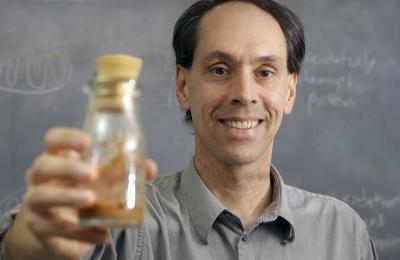January 13, 2005
Using fruit flies to study nerve degeneration
Since Dr. Leo Pallanck was a graduate student, he has been interested in studying genetics in model organisms. Now that Pallanck is a genome sciences researcher at the UW, he is channeling that interest into an effort to unlock the secrets of Parkinson’s disease, a devastating neurodegenerative disease.
Pallanck is studying Drosophila, the fruit fly, as a genetic model for Parkinson’s in humans.
Parkinson’s disease, one of the most common neurodegenerative diseases, is a progressive disorder that affects movement. It occurs when dopamine-producing cells in the brain’s basal ganglia begin to malfunction and die. That leads to a decreased production of dopamine, a neurotransmitter involved in body movement.
Pallanck was drawn to studying neurological diseases like Parkinson’s because scientists still know little about the causes and mechanisms of the conditions. After receiving his bachelor’s degree in biochemistry in 1985 from the University of California, Davis, he studied RNA-binding proteins at Albert Einstein College of Medicine, earning his Ph.D. in 1992.
As a postdoctoral researcher at the University of Wisconsin Madison, he investigated what happens at the molecular level in fruit flies when nerve cells release neurotransmitter chemicals. Pallanck joined the UW Department of Genetics, now the Department of Genome Sciences, in 1997, and continued to study neurotransmitter release mechanisms.
But he has since shifted the focus of his work to creating models of Parkinson’s and other neurodegenerative disease in fruit flies. Researchers can mimic the disease by introducing human genes involved in Parkinson’s disease into Drosophila, or by creating mutations in Drosophila genes that correspond to human genes implicated in Parkinson’s.
They hope that by studying the genetic and molecular mechanisms of the disease in fruit flies, we will be able to better understand those same processes in humans. Such advances could lead to isolating the cause of Parkinson’s, as well as spurring development of treatments for the disease.
Pallanck’s lab has focused on two genes involved with Parkinson’s: the parkin gene and the alpha-synuclein gene. Scientists know that the alpha-synuclein protein can have toxic effects in nerve tissue, but they don’t yet understand why it is toxic or why it may be more toxic in some people than others.
Expressing the human alpha-synuclein gene in fruit flies causes dopamine-producing neurons to die off, similar to the process of Parkinson’s in humans. Pallanck and his colleagues are now searching a group of recently identified candidate genes for ones that enhance or suppress the toxicity of alpha-synuclein.
A mutation in the parkin gene can cause the parkin protein to malfunction, but researchers don’t understand exactly how that malfunction relates to symptoms of Parkinson’s. Replicating the parkin gene mutation in fruit flies causes dopamine-producing neurons to die off, as well as the loss of muscle.
Pallanck and his colleagues have also found that fruit flies with both the parkin gene mutation and a mutated gene for glutathione s-transferase (GST) have much worse neuron death and muscle loss. Knocking out the GST gene acts as an enhancer for the symptoms of Parkinson’s, the researchers found. Likewise, over-expressing the normal GST gene prevents the loss of the dopamine neurons, which could protect against the effects of the disease itself.
The researchers hope that further study of glutathione s-transferase could aid in using that as a target for a preventive or therapeutic treatment for patients with Parkinson’s disease.
Pallanck will discuss his lab’s most recent work on the disease in the first 2005 Science in Medicine New Investigator Lecture, “What Can Fruit Flies Tell Us About Parkinson’s Disease?” scheduled for noon on Thursday, Jan. 27, in room T-625 of the UW Health Sciences Building. The lecture will be simulcast at Harborview Medical Center in the auditorium of the Research and Training Building, as well as at the VA Puget Sound Health Care System in Building 1, Room 518.
For more information, contact Vee White at veewhite@u.washington.edu or 206-543-8319.



